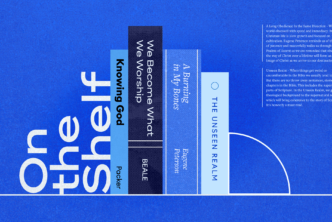People have been asking, “Which Bible commentary is best?” for as long as anyone can remember. They’re such a well-loved and useful Bible study tool that entire commentaries have been written—about commentaries.
We won’t try to dive into all the best exegetical Bible commentaries here or even all the best exegetical Bible commentary series. So you can explore them all in just a few minutes, we’ve narrowed it down to only seven exceptional selections.
But first, what is an exegetical commentary, exactly? Here’s a brief description of these Bible study resources:
Exegetical commentaries bridge the gap between critical commentaries and expositional commentaries. Typically, they go verse by verse through a passage—still including critical issues, but selectively. You’ll read original language observations, but typically exegetical commentaries move from observation to interpretation. (You’ll see an example with the seventh commentary.)
Seven of the best exegetical Bible commentaries, selected because of their popularity and reputation, are . . .
1. New International Commentary on the Old and New Testaments (NICOT/NICNT)
NICOT/NICNT volumes are some of the highest-rated evangelical commentaries in existence. On bestcommentaries.com:
- 15 volumes are ranked #1 for their book
- 39 make the top 3
- Only 7 volumes fall outside the top 5
Pastors, seminarians, and other students of the Bible love this series, and here are a few reasons why:
- They are evangelical: Every author in the series affirms Scripture as the inspired, infallible word of God.
- They are critical yet theological: Authors apply modern scholarly methods and deal in textual criticism and textual, literary, and form analysis. Comments are based on the author’s own translation of the Greek or Hebrew and thus stand on a deep familiarity with the text. But comments transcend observation, moving into theological reflection and application.
- They are well organized: Since broader commentary is usually placed in the body text and technical comments in the footnotes, it’s easy to locate areas of interest and then dig deeper.
The NICOT/NICNT series is a keep-in-the-trunk toolbox for every occasion. It strikes a nice balance without losing thoroughness.
With over 46 contributions, including Gordon Fee, David deSilva, Scot McKnight, F. F. Bruce, and Bruce Waltke, the series boasts gifted scholars writing on their areas of expertise.
2. Expositor’s Bible Commentary (EBC)
The first thing you should read about the EBC is this review from Logos Bible Software user Jim M.:
The text is well written, full of excellent insights, scholarly without being dry, and is eminently readable and easy to understand. It flows so well and holds your interest that reading it is more like reading a nonfiction novel than a reference work. I find that I usually read beyond what I intended to look up.
Perhaps that kind of readability is why it’s sold over two million copies? It also won the coveted Gold Medallion Book Award for exceptional Christian content. Originally published in 1976, the series has become a benchmark tool for pastors and Bible students.
The popular commentary series was revised in 2012, and the updated version (REBC) provides an analysis of each biblical book, plus an introduction, outline, and bibliography.
Craig Keener calls the REBC “an abundance of excellent scholarship from many of the most prominent and careful evangelical biblical scholars today.” A team of 50 respected authors contributed their expertise, each articulating well-researched convictions while dealing fairly with opposing points of view.
3. Baker Exegetical Commentary on the New Testament (BECNT)
Praised for both its thoughtful scholarship and readability, the BECNT is one exegetical commentary you’ll find in many a Bible study library.
A wide variety of scholars from differing theological persuasions contributed, offering a diverse bank of scholarly knowledge. By investigating a variety of viewpoints—while maintaining allegiance to biblical truth—the BECNT provides an authoritative view of each study passage.
Eight of the 18 volumes are ranked 3 or above on bestcommentaries.com, and seminary professors love it:
This series has set a new standard in reader-friendliness with its attractive presentation that combines detailed exegetical comment on the Greek text with accessibility for those who have little or no knowledge of the original language of the New Testament.
—I. Howard Marshall, emeritus professor of New Testament exegesis at University of Aberdeen
4. Zondervan Exegetical Commentary on the New Testament (ZECNT)
Written with Bible teachers and preachers in mind, Zondervan Exegetical Commentary on the New Testament (ZECNT) dives both into what the text means and its application for today.
Each of its 10 volumes gives you an exegetical outline with verse-by-verse commentary. It engages scholarly literature, but it’s not bogged down with technical jargon—the series’ aim is not to review and critique every possible interpretation of a passage.
Instead, the goal is to exegete each passage of Scripture succinctly in its grammatical and historical context. Each passage is interpreted in light of its biblical setting with attention to grammatical detail, literary context, flow of biblical argument, and historical setting.
The ZECNT is a go-to commentary for many pastors. Here’s why, from Logos user Brett K.:
I’m sad when I’m speaking from a book that has yet to have a ZECNT commentary. I love that this series is meant specifically for pastors. It utilizes basic to moderate knowledge of Greek, but you don’t need them to understand the work. I also appreciate that there is a Semantic diagram of the passage in English to show the thought flow of the author. Each commentary is quite succinct so you don’t end up reading more information than necessary. I think this is part of their goal to equip pastors and teachers rather than focus on academic debates.
5. New International Greek Testament Commentary (NIGTC)
This five-star commentary helps students of the Bible exegete Scripture—with understanding of the historical, linguistic, and textual context. Even students new to Greek will glean from detailed verse-by-verse commentary and insightful comments about each section of the text.
If you were to scroll through praise of NIGTC’s 13-volume collection, you’d read comments like this one on Epistle to the Galatians from The Expository Times: “Massive learning is combined with an easy style. Students who work carefully through this commentary alongside the Greek New Testament will learn much.”
And NIGTC volumes have won multiple awards:
- Academy of Parish Clergy Top Ten Books of the Year (2001) 1 Corinthians
- Evangelical Christian Publishers Association – Gold Medallion award for Commentaries (1983) Galatians
- Academy of Parish Clergy Top Ten Books of the Year – Special Recognition (1997) Colossians & Philemon
- Christianity Today – Number 3 Critics Choice for Commentaries (1994) Hebrews
- Evangelical Christian Publishers Association – Gold Medallion finalist for Reference/Commentary (2001) 1 Corinthians
No wonder NIGTC’s The Gospel of Mark, Philippians, The Epistles to the Thessalonians, and The Book of the Revelation are ranked number one at bestcommentaries.com.
6. Pillar New Testament Commentary (PNTC)
The PNTC is beloved for its balance of in-depth exegesis with real-world application. It’s designed for both serious Bible students and for general readers of the Bible—and in fact, it’s one of the best-selling commentary series on logos.com.
These volumes avoid excessive technical detail, yet they discuss the most important contemporary debates. Contributing scholars are deeply committed to a fresh wrestling with the text, to “loosening the Bible from its pages” so that readers understand what the text says and how to apply it.
In the series preface, The Letters of John author D. A. Carson explains the contributors’ perspective:
The writers of this series aim for an evenhanded openness to the text that is the best kind of “objectivity” of all.
If the text is God’s Word, it is appropriate that we respond with reverence, a certain fear, a holy joy, a questing obedience. These values should be reflected in the way Christians write. With these values in place, the Pillar commentaries will be warmly welcomed not only by pastors, teachers, and students, but by general readers as well.
To enable well-rounded Bible study, each book’s authorship, date, purpose, structure, and theology are included. It’s no surprise PNTC’s The Letters of John, The Letter of James, Ephesians, and The Gospel According to John are all ranked number one at bestcommentaries.com.
7. Evangelical Exegetical Commentary (EEC)
The Evangelical Exegetical Commentary Series offers an exhaustive exploration of Scripture that’s refreshingly readable—while meeting the exacting standards of critical biblical scholarship.
For an example, take a look at the volume on Ephesians. This six-chapter book gets an in-depth discussion spanning 672 pages. This excerpt gives you an idea of what that looks like:
1:2 χάρις ὑμῖν καὶ εἰρήνη (charis hymin kai eirēnē), “grace to you and peace.” Ancient Greek letters normally opened with χαίρειν (chairein), “greetings” (as Acts 15:23; 23:26; Jas 1:1), but Paul and other NT authors typically open theirs with a benediction that has similar-sounding χάρις (charis), as here (cf. Rom 1:7; 1 Cor 1:3; 2 Cor 1:2; Gal 1:3; Eph 6:24; Phil 1:2; Col 1:2; 1 Thess 1:1; 2 Thess 1:2; 1 Tim 1:2; 2 Tim 1:2; Titus 1:4; Phlm 3; Rev 1:4–5). Both grace and peace are frequent terms in Ephesians and other Paulines; see especially comments on Eph 2:8 and 2:14–17. The inspiration for pronouncing such a benediction on the audience is undoubtedly the great Aaronic benediction in Num 6:22–27.114 As such it is not the expression of a wish or of a prayer but the priestly conveyance of blessing based on the Lord’s promise: “So shall they put my name upon the people of Israel, and I will bless them” (Num 6:27).
ἀπὸ θεοῦ πατρὸς ἡμῶν καὶ κυρίου Ἰησοῦ Χριστοῦ (apo theou patros hēmōn kai kyriou Iēsou Christou), “from God our Father and from the Lord Jesus Christ.” We might expect the source of all blessings to be identified by a first-century Jew steeped in the OT to be “the Lord God” or “the Lord our God.” Instead the fatherhood of God is referenced and the full title of the Messiah as “the Lord Jesus Christ.”
Application and Devotional Implications
In a phrase we have grown used to, Paul pronounces a blessing on his audience “from God our Father.” That God the Father is our Father should be seen as the most extraordinary privilege imaginable. Both the OT and NT testify that God acts as a Father to his people in the most persistently loving fashion: “For as high as the heavens are above the earth, so great is his steadfast love toward those who fear him; … As a father shows compassion to his children, so the Lord shows compassion to those who fear him” (Psa 103:11–13). The Sovereign God of the universe intimately and tenderly identifies with us his adopted children, who were once “children of wrath” (2:3). This is all brought about through the mediation of the second person named in the benediction: “grace to you and peace from God our Father and from Jesus Christ.”
Other hallmarks include:
- a distinctly evangelical perspective rooted in the original text
- reflection on the latest biblical scholarship
- investigation into original context
Contributors include Eugene Carpenter, Harry A. Hoffner Jr., JoAnna M. Hoyt, and S. M. Baugh. Andreas Köstenberger—leading New Testament scholar, prolific author, and editor of the premier evangelical theological journal—serves as New Testament editor. Though it’s a work currently underway, 15 volumes are already available. They’ve received glowing reviews like this one from Eugene H. Merrill of Dallas Theological Seminary regarding the Daniel volume:
Masterful in its use of Hebrew and Aramaic, without peer in the depth and breadth of its citation of relevant resources, and engagingly delightful in the clarity of its literary style.
***
And there you have it! Seven exegetical commentaries you can’t go wrong with choosing.
But before you decide which one(s) to add to your library, there’s one thing that will help you squeeze every drop of benefit from any commentary you buy. Sound good?
The best way to use the best commentaries
You can take an excellent Bible study resource and make it even more powerful with just one decision—adding it to a Logos digital library instead of a physical library.
Of course, you can then take all your inches-thick commentaries everywhere you go and access them from any desktop, laptop, phone, or tablet. Talk about packing light.
But . . .
That’s only one ingredient to faster, easier, more efficient study of Scripture.
Save hours each week and make sure you don’t miss any insights from your carefully selected theological resources, just by accessing your commentaries inside Logos.
Here’s a glimpse at how . . .
Logos user Philip J. says, “Over 25 years, Logos has saved me countless hours of search time to find a verse, illustration, help with prayer time, Scripture memory, and study prep time.”
Plus, with Logos packages, you save around 90% compared to the cost of buying resources individually. Find the option that’s right for you! Since there’s a 30-day happiness guarantee, you can always go back to paper if you don’t love how Logos helps supercharge Bible study.





